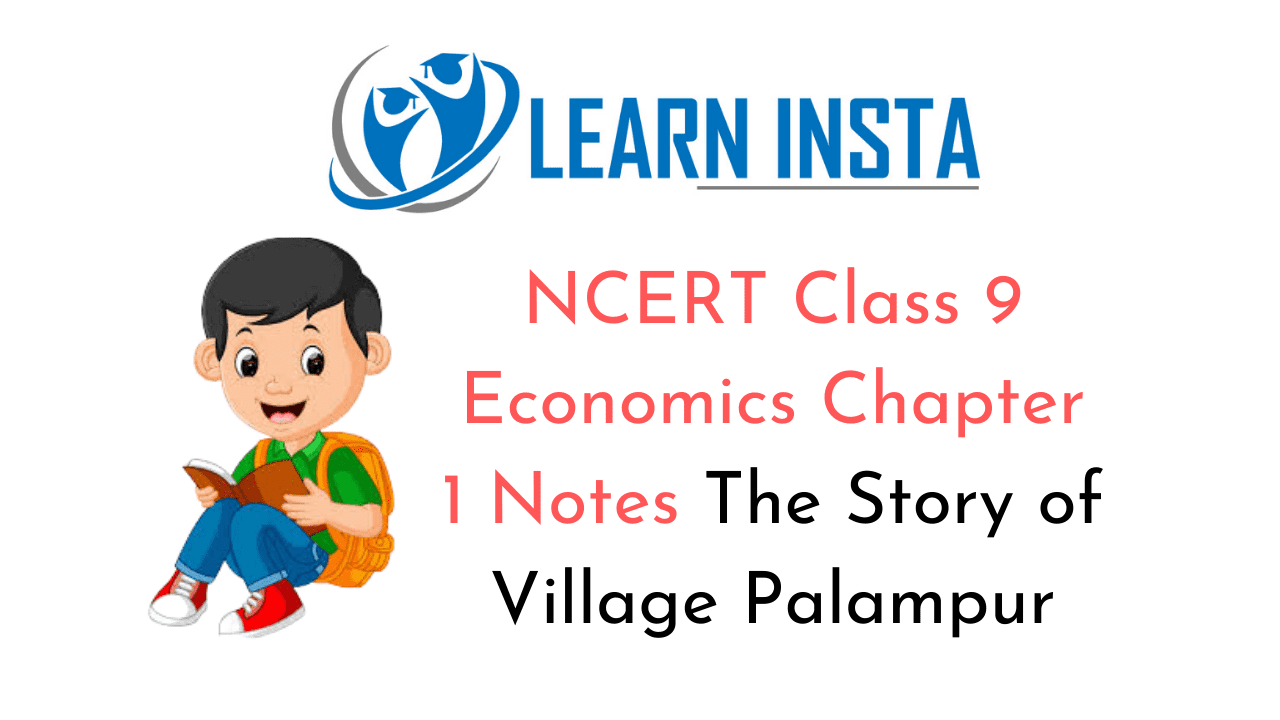
On this page, you will find NCERT Class 9 Economics Chapter 1 Notes Pdf free download. CBSE Class 9 Social Science Notes Economics Chapter 1 SST The Story of Village Palampur will seemingly, help them to revise the important concepts in less time.
The Story of Village Palampur Class 9 Notes Social Science Economics Chapter 1
CBSE Class 9 Economics Chapter 1 Notes Understanding the Lesson
1. Farming is the main production activity in the village. Other activities are small scale manufacturing, dairy, transport, etc. However, these activities are carried on a limited scale.
2. All the production activities need various types of resources such as natural resources, man-made items, human effort, money, etc. These resources are combined to produce the desired goods and services in the village.
3. There are four requirements for production of goods and services-land, labour, physical capital and human capital. These are called factors of production.
4. Land area under cultivation is practically fixed in the village. However, over the years there have been many important changes in the way farming is practised. These have allowed the farmers to produce more crops from the same amount of land. But in raising production a great deal of pressure has been put on land and other natural resources.
5. The new ways of farming need less land, but much more capital. The medium and large farmers are able to arrange for capital during the next season. But the small farmers, who constitute about 80 per cent of total farmers in India, find it difficult to obtain capital.
6. Small farmers have small size of plots, so their production is not enough. These farmers have to do additional work as farm labourers to feed themselves and their families.
7. Labour being the most abundant factor of production, it would be ideal if new ways of farming used much more labour. But such a thing has not happened. The use of labour on farms is limited. The labour, looking for opportunities is thus migrating to neighbouring villages, towns and cities. Some labour has entered the non-farm sector in the village.
8. At present, the non-farm sector in the village is not very large. Though there is a variety of non-farm activities in the villages, the number of people employed in each is quite small.
9. Unlike farming, non-farming activities require little land. People with some amount of capital can set up non-farm activities. To obtain capital, one can either use his own savings, or can take a loan. It is important that loan be available at low rate of interest so that even people without saving can start some non-farm activity.
10. Another thing which is essential for expansion of non-farm activities is to have markets where the goods and services produced can be sold. In Palampur, the neighbouring villages, towns and cities provide the markets for milk, jaggery, wheat, etc.
11. Opportunities for non-farm activities in villages would increase if they get connected to towns and cities through good roads, transport and telephone.
The Story of Village Palampur Class 9 CBSE Notes Important Terms
Goods: In economics, good are materials that satisfy human wants and provide utility.
Services: A system supplying a public need such as transport, communications, or utilities, such as electricity and water.
Production: The action of making or manufacturing from components or raw materials, or the process of being so manufactured.
Land: Primary input and factor of production which is not consumed but without which no production is possible.
Physical capital: A factor of production or input into the process of production, such as machinery, buildings or computers.
Fixed capital: That portion of the total capital outlay that is invested in fixed assets such as land, buildings, vehicles, plant and equipment, that stay in the business almost permanently, or over many years.
Working capital: Raw materials and money in hand are called working capital.
Human capital: The skills, knowledge, and experience possessed by an individual or population, viewed in terms of their value or cost to an organisation or country.
Pesticide: A substance used for destroying insects or other organisms harmful to cultivated plants or to animals.
Multiple cropping: Growing more than one crop on a price of land during the year.
Capital: Wealth other than land which is used in production of goods or services.